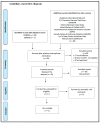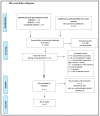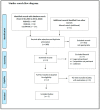Do Vegetarian Diets Provide Adequate Nutrient Intake during Complementary Feeding? A Systematic Review
- PMID: 36079848
- PMCID: PMC9459879
- DOI: 10.3390/nu14173591
Do Vegetarian Diets Provide Adequate Nutrient Intake during Complementary Feeding? A Systematic Review
Abstract
During the complementary feeding period, any nutritional deficiencies may negatively impact infant growth and neurodevelopment. A healthy diet containing all essential nutrients is strongly recommended by the WHO during infancy. Because vegetarian diets are becoming increasingly popular in many industrialized countries, some parents ask the pediatrician for a vegetarian diet, partially or entirely free of animal-source foods, for their children from an early age. This systematic review aims to evaluate the evidence on how vegetarian complementary feeding impacts infant growth, neurodevelopment, risk of wasted and/or stunted growth, overweight and obesity. The SR was registered with PROSPERO 2021 (CRD 42021273592). A comprehensive search strategy was adopted to search and find all relevant studies. For ethical reasons, there are no interventional studies assessing the impact of non-supplemented vegetarian/vegan diets on the physical and neurocognitive development of children, but there are numerous studies that have analyzed the effects of dietary deficiencies on individual nutrients. Based on current evidence, vegetarian and vegan diets during the complementary feeding period have not been shown to be safe, and the current best evidence suggests that the risk of critical micronutrient deficiencies or insufficiencies and growth retardation is high: they may result in significantly different outcomes in neuropsychological development and growth when compared with a healthy omnivorous diet such as the Mediterranean Diet. There are also no data documenting the protective effect of vegetarian or vegan diets against communicable diseases in children aged 6 months to 2-3 years.
Keywords: complementary feeding; growth; infections; malnutrition; neurodevelopment; not communicable diseases; overweight; vegetarian; vitamin B12; weaning.
Conflict of interest statement
All the authors declare no conflict of interest.
Figures



References
-
- World Cancer Research Fund. American Institute for Cancer Research . Food, Nutrition, Physical Activity and the Prevention of Cancer: A Global Perspective. World Cancer Research Fund; American Institute for Cancer Research; Washington, DC, USA: 2007.
-
- WHO Fifty-Fifth World Health Assembly, Provisional Agenda Item 13.10. Infant and Young Child Nutrition, Global Strategy on Infant and Young Child Feeding. Geneva 16-04-2002. [(accessed on 30 July 2022)]. Available online: https://apps.who.int/iris/handle/10665/78470.
-
- Kim H., Rotundo L., Song D. The Prevalence and Characteristics of Vegetarian in the United States: A Population-Based Study. Gastroenterology. 2017;152((Suppl. 1)):S1016. doi: 10.1016/S0016-5085(17)33443-1. - DOI
Publication types
MeSH terms
LinkOut - more resources
Full Text Sources
Medical
Research Materials

